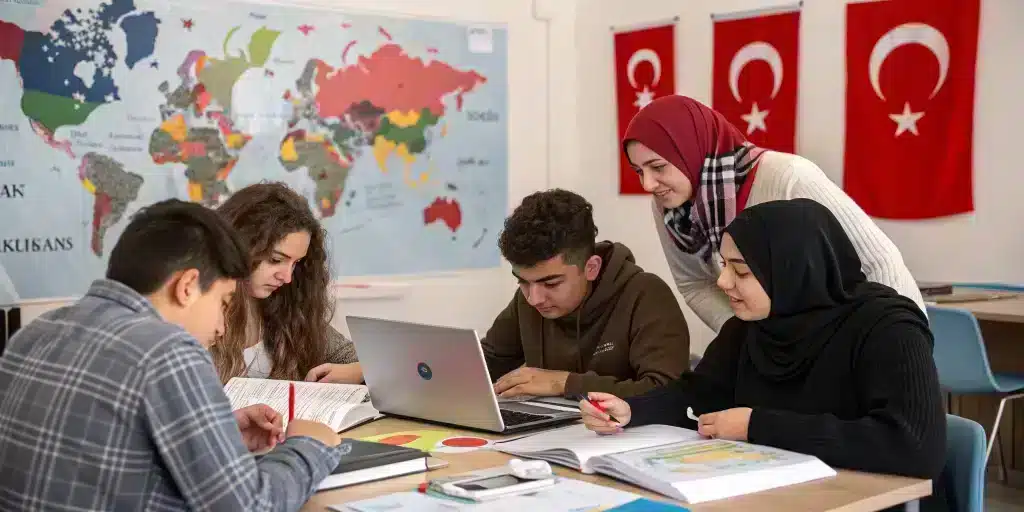Understanding the Importance of Group Projects and Teamwork in Turkish Undergraduate Programs
Characteristics of Effective Team-Based Learning
Examples from Project Management Programs
Skill Development Through Teamwork
Cross-Disciplinary Collaboration
Conclusion
Inclusion of Group Projects in Curricula
Turkish universities understand the importance of teamwork in academic settings. Many undergraduate programs, particularly in disciplines like Project Management, actively incorporate group projects and presentations as essential components of their courses. This pedagogical strategy is designed to:
- Foster collaboration through structured team assignments.
- Enhance communication among diverse groups of students.
- Develop leadership skills, critical for future workplace environments.
By embedding teamwork into the educational framework, institutions ensure that students are well-equipped for professional challenges, making them attractive candidates for international recruitment.
Characteristics of Effective Team-Based Learning
- Project-Based Assignments: Students engage in comprehensive projects that require planning, execution, and presentation as a team.
- Interdisciplinary Collaboration: Teams often comprise students from various disciplines, enriching the learning experience through diverse perspectives.
- Real-World Simulations: Group projects mimic real-world scenarios, wherein students must collaborate to solve complex issues, manage timelines, and share responsibilities.
Examples from Project Management Programs
Universities such as Medipol University and Uskudar University exemplify the strategic inclusion of group projects within their Project Management courses. The curriculum typically emphasizes:
- Joint presentations and collaborative report writing.
- Practical exercises in crucial project management areas such as risk management, cost estimation, procurement, and quality assurance.
These initiatives enable students to navigate the dynamics of teamwork effectively while honing their problem-solving capabilities.
Skill Development Through Teamwork
Participation in group projects is crucial for personal and professional growth. Students develop various competencies essential for their careers, including:
- Communication and interpersonal skills: Essential for articulating ideas and navigating group dynamics.
- Leadership and delegation: Students practice leading their teams and delegating tasks efficiently.
- Conflict resolution: Teamwork fosters an environment where students learn to resolve disputes amicably and build consensus.
- Time and resource management: Students learn to prioritize tasks and manage group resources effectively to meet project deadlines.
Cross-Disciplinary Collaboration
The emphasis on teamwork in Turkish undergraduate programs extends beyond Project Management. Fields such as Business Administration, Engineering, and Social Sciences also integrate teamwork-based assignments. This fosters an appreciation for collaboration and diverse perspectives among students, which is crucial for adapting to the multicultural environments they will encounter in their careers.
Advantages of Cross-Disciplinary Projects
- Enhanced Learning: Students benefit from the expertise and insights of peers from different disciplines.
- Improved Problem-Solving: Diverse teams are better equipped to address complex challenges through varied approaches and perspectives.
- Network Building: Students build networks across various fields, establishing connections that may benefit their future careers.
Conclusion
Group projects and teamwork represent essential elements of undergraduate education in Turkiye, particularly within practice-oriented programs like Project Management. The deliberate inclusion of collaborative activities in curricula reflects the broader goal of equipping students with the critical skills needed for success in international and multicultural professional settings. Notable universities like Beykent University, Galata University, and Bilgi University exemplify this commitment, ensuring that graduates are not only knowledgeable but also adept at working within teams.
In light of this focus on collaboration, it is clear that universities in Turkiye are uniquely positioned to prepare the next generation of global leaders. For agencies and professionals interested in student placement or international education partnerships, aligning with Turkish institutions presents a valuable opportunity.
Take the Next Step with Study in Turkiye
Explore your options for studying in Turkiye and take the first step toward your international education journey. Connect with us at Study in Turkiye for additional guidance and support.

